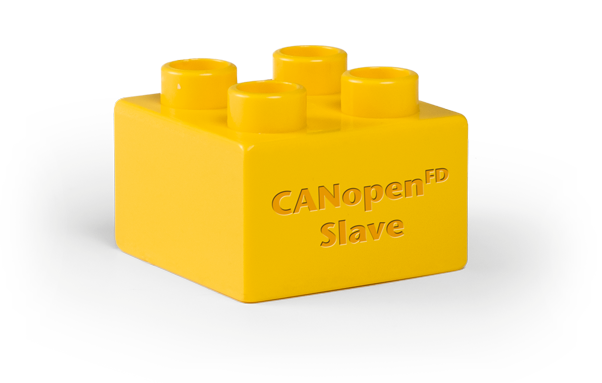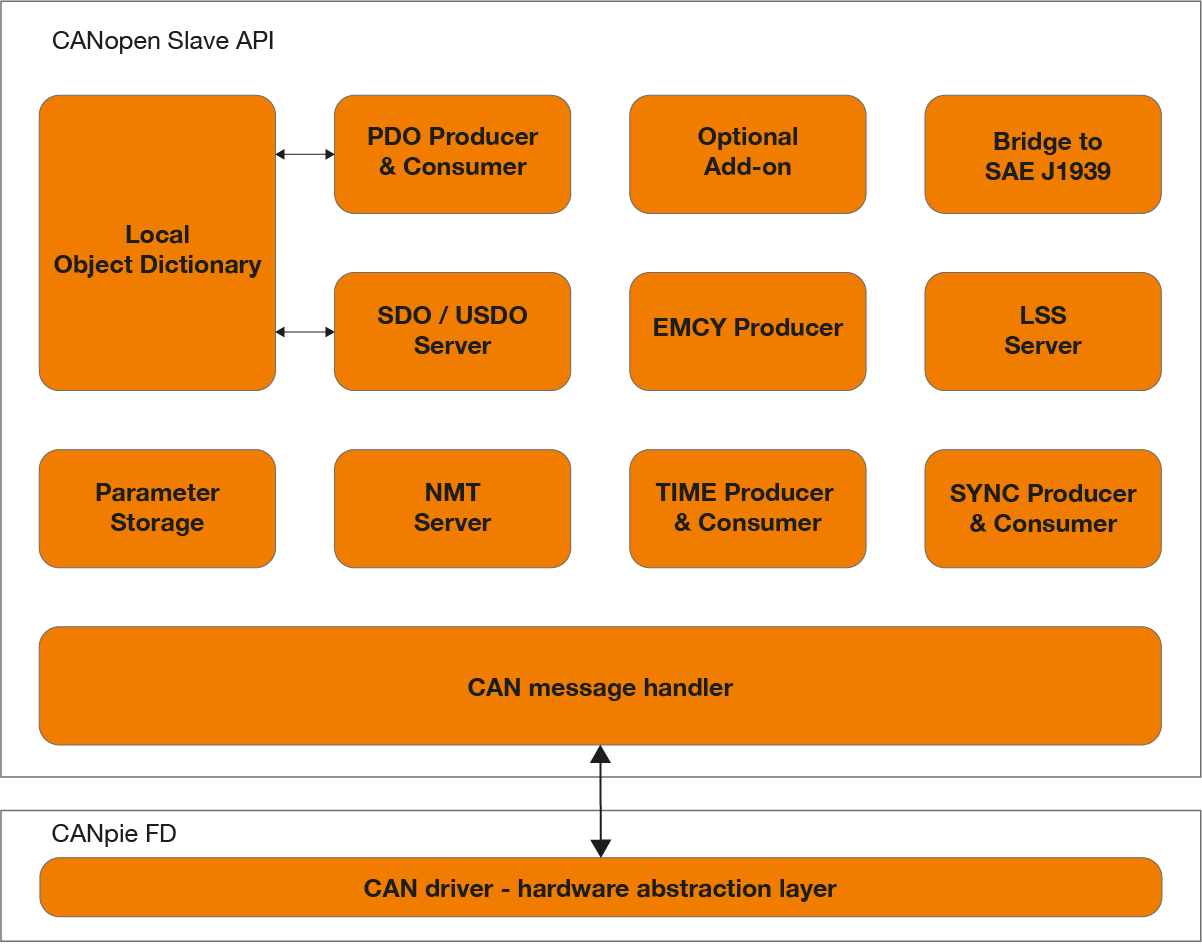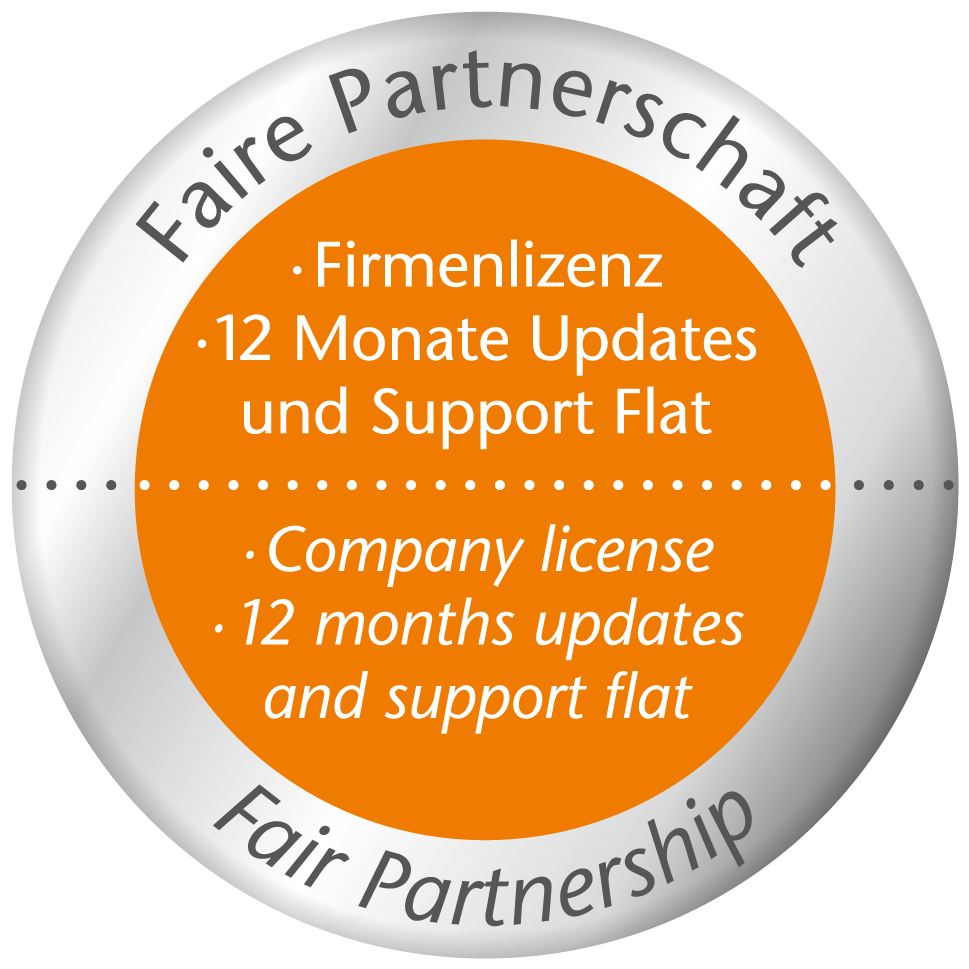Protocol Stacks
Protocol Stack
CANopen / CANopen FD Slave

The CANopen / CANopen FD Slave protocol stack has been optimized for low resource requirements and is, thus, well suited for intelligent sensors and actuators. The protocol stack offers the complete functionality for integration of the CANopen standards CiA 301 (FD: CiA 1301) and CiA 305 into your devices. The following CANopen services are supported:

- Service Data Objects (SDO / USDO Server)
- Process Data Objects (PDO Consumer & Producer)
- Network Management (NMT Slave)
- Emergency Messages (EMCY Consumer & Producer)
- Synchronization Messages (SYNC Consumer & Producer)
- Layer Setting Services (LSS Slave)
- Time server ( TIME Producer / Consumer)
The number of PDOs can be configured within a range from 0 to 32 for Transmit-PDOs (TPDO) as well as for Receive-PDOs (RPDO). For any configuration the pre-defined connection set (CIA 301 / 1301) will be respected automatically. In addition, PDO linking can be disabled for safety-critical applications.
Versatile configuration options allow individual customization to the target system. Example codes facilitate the startup phase, enabling the user to focus on the implementation of their own application. The open CAN driver (CANpie FD) provides the flexibility to use any CAN controller available on the market.
Features
- Functional range according to CANopen specification CiA 301 / CANopen FD specification CiA 1301
- Support of Layer Setting Services (LSS, CiA 305)
- Modular software structure with versatile configuration options
- Adjustment to target product without affecting the code structures
- Optimized for low resource requirements (ROM / RAM)
- Broad range of supported CAN controllers
- Consistent interface for the CAN driver (CANpie FD)
- Easy enhancement of object dictionary (vendor specific parameters)
- Various add-ons available (device profiles / safety)
- Support of network variables (CiA 302-4)
- Bridge function to J1939 protocol software
Scope of Delivery
The CANopen / CANopen FD Slave protocol stack will come as C99 source code by download link.
Documentation in English is available at Github.
The scope of delivery also contains:
- Site-related company licence, no additional runtime costs
- 12 months technical support by email or telephone
- Ready-to-run examples for various demo boards
Option Mini-Master
The option Mini-Master adds the following functions to our CANopen Slave protocol stack:
- SDO Client: parameterization of other CANopen slave devices
- NMT master: change NMT condition of other CANopen slave devices
- LSS master: adjustment of bit rates and node ID
Option Safety
The Option Safety provides an implementation of the European standard EN 50325-5 featuring the following functions:
- Max. 8 SRDOs (SR Data Object)
- Global fail-safe command
- Expansion of the CANopen Slave object dictionary
Fair Partnership policy offers company licence and free support service
To complement the Microcontrol product portfolio, we also offer CANopen workshops, software tools as well as technical advice and support in the development of your CANopen device.
Ordering Information
Protocol stack in C99 source code, example programmes, documentation in English, provided by download link
The option mini-master extends the functional range of the CANopen slave protocol stack
Functional expansion of the API of the CANopen Slave Protocol stack in compliance with the European standard EN50325-5
Device profile for digital and analogue I/O modules
Device profile for drives and motion control
Device profile for sensors and actuators
Device profile for encoders
Device profile for inclinometers
Application profile for lifter control systems
Device profile for batteries
Device profile for charging devices
Application profile for photovoltaic components
API for the CAN implementation for the respective microcontroller
Documentation
Downloads
Datasheet, Rev. L
CANopen / CANopen FD Slave Protocol Stack
PDF [258 KB]
Application Note 1201
Introduction to CANopen
PDF [367 KB]
MicroControl Flyer Protocol Stacks
PDF [715 KB]
Any questions?

+49 2241 – 25 65 9 – 0
Write an email or give us a call.

